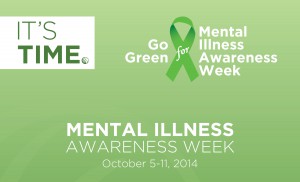“There is no health without mental health”
 This week is Mental Illness Awareness Week (October 5-11). Working at the intersection of physical and mental health is Ann Becker-Schutte, PhD, a Kansas City psychologist whose practice is focused on supporting people impacted by serious illness.
This week is Mental Illness Awareness Week (October 5-11). Working at the intersection of physical and mental health is Ann Becker-Schutte, PhD, a Kansas City psychologist whose practice is focused on supporting people impacted by serious illness.
“Challenging stigma requires that you have some vocabulary, some tools, some ground to stand on,” Ann states. In trying to help create a tool or language to discuss stigmas in health, Ann created the phrase “healthy privilege.”
What is healthy privilege?
“Healthy privilege is a term I started using last year to explore the pervasive expectation that healthy is ‘normal.'”
The idea is that one group whose status is unearned (the privileged) assumes that others are lacking in some way.
“I see it manifest in tons of ways. When a person with cancer is told that they ‘wished it on themselves:’ when someone with diabetes is shamed because it is perceived as a ‘self-inflicted’ disease: fundamentally, whenever someone who has been fortunate enough to remain healthy implies that their health is ‘earned.'”
Stigma is a result of this attitude of “privilege.”
“It is an assumption that someone with illness must be at fault or tainted. Yet I know people who did everything “right” and who still have metastatic cancer. It’s a roulette wheel.”
At the crux of this attitude of stigma is fear and misunderstanding.
“A challenge with health stigma is that there is very real fear about ‘contagion.’ It reminds people of their own fragility and lack of control. While there are certainly steps that all of us can take to support health (like moving, eating well, sleeping), at the end of the day, we can still have health problems.”
Healthy privilege appears in platitudes like “suffer in silence” and “offer it up,” or in language like “it is your thoughts that cause illness.”
Ann states, “There are complicated relationships linking thoughts and stress, but I would  disagree with these shaming messages. On the surface, I think it is ridiculous to assume that we can think/pray/wish our way into good health. It’s true that a positive attitude can help one cope with health challenges. That said, people also need safe space to talk about the very real pain, struggle, anger, frustration and sadness they feel.”
disagree with these shaming messages. On the surface, I think it is ridiculous to assume that we can think/pray/wish our way into good health. It’s true that a positive attitude can help one cope with health challenges. That said, people also need safe space to talk about the very real pain, struggle, anger, frustration and sadness they feel.”
The fact that patients are sharing their stories is beginning to make a difference, Ann believes. “Like the changes that are occurring in acceptance of LGBT, people are realizing ‘I know you, you’re like me.'”
Why is it taking so long for American culture to understand that mental and physical well being are interrelated? There are many reasons. Ann notes that popular culture can be faulted. “The depiction of mental health issues in popular culture is either mocking or terrifying. There are very few genuine portrayals. Maybe we need the mental health version of the show, ‘Will & Grace.’ The fact that you aren’t bleeding or visibly broken when you are facing depression or anxiety can lead others to minimize the experience.”
In order to increase understanding of the connection between mental and physical health, “it is critical to get in touch with our compassion. Suffering happens to all of us, just in different forms. Minimizing or stigmatizing others because their suffering is invisible won’t protect you…Personal stories are powerful in breaking down the walls of stigma. They encourage others to speak up.”
Ann Becker-Schutte also leaves some final thoughts on the matter. “Health stigma is real and damaging.” As an extension of that, “whole people deserve whole healthcare.” If we can act from these observations, “we can create change.”
Based on the June 26, 2014 #HCHLITSS Twitter chat.






By introducing “privilege” into to health-mental health
domain, Dr.Becker-Schutte has, in addition, opened
the discussion to include the impact of privilege deficits
in other domains, i.e. financial, social, cultural, racial and
educational on access to health.
These are difficult issues to discuss, but if we are
to be inclusive in any honest way, we must also
acknowledge that some segments of our populaiton
are mulitply stigmatized with severe health and
mental health consequences.
I have noticed there is a connection between mental health and physical health too. Anytime there is a personal problem or anxiety about something I feel not very good physically. I think you are on the right path, people should be more aware of this connection.